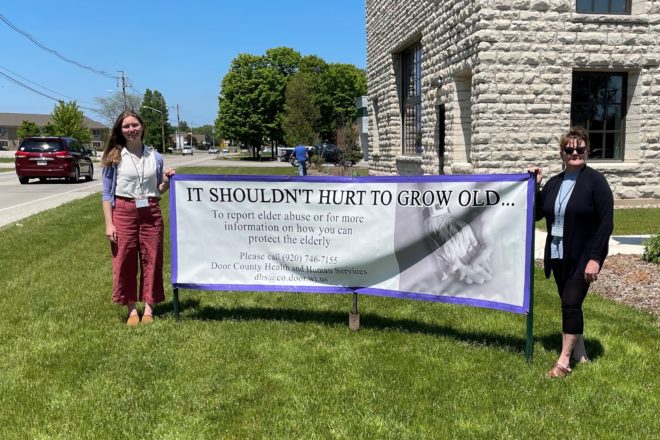Coordinated Community Response: Elder Abuse in Door County
- Share
- Tweet
- Pin
- Share

by Door County Adult Protective Services
Door County Adult Protective Services received 195 referrals of abuse against people ages 60 and older in 2020. Last year it was unclear whether social-distancing recommendations would prevent families, friends, neighbors and providers from connecting with vulnerable older adults, but a recent Wisconsin Department of Health Services report revealed that the number of referrals in 2020 was closer to the five-year average of 256 than anticipated.
In observation of World Elder Abuse Awareness Day, designated as June 15, Door County Adult Protective Services encourages everyone to learn more about elder abuse, responses to it and prevention strategies.
Types of Elder Abuse
Physical abuse includes any type of bodily harm, such as hitting, pushing, slapping, burning or restraining people against their will.
Emotional and psychological abuse includes using hurtful words, yelling, making threats, repeatedly ignoring people or isolating them from support systems. This abuse causes emotional pain, distress or anguish.
Neglect occurs when caregivers do not fulfill their duty to care for a dependent adult. This includes withholding food, medications, access to health care or assistance with hygiene.
Sexual abuse involves any nonconsensual sexual contact with an older adult. This includes forcing someone to watch or be part of sexual acts, or any sexual contact with a person who is incapable of giving consent because of confusion or limited cognition.
Financial abuse or exploitation occurs when belongings or money are stolen or coerced from an older adult. This can happen to people who make their own decisions as well as those who have alternative decision makers, and financial abuse can be perpetrated by people known to the older adult or by strangers.
• Self-neglect occurs when older adults do not provide adequate hygiene, food, water, medications, shelter or safety for themselves.
Signs of Elder Abuse
Signs that an older person is being abused include increased depression, confusion or withdrawn behavior; isolation from family and friends; unexplained or suspicious bruises, burns or scars; appearing dirty, underfed, dehydrated, over- or under-medicated, or not receiving necessary medical care; bed sores or other preventable conditions; and/or recent changes in banking or spending patterns.
How to Respond to Suspected Abuse
If you feel comfortable talking with the individual, let him or her know that you care and are offering support without any judgment. To report abuse, neglect, exploitation or self-neglect, call Door County Adult Protective Services at 920.746.7155 or your local law-enforcement agency.
Additional support resources include HELP of Door County, the Aging and Disability Resource Center of Door County, the Elder Rights Project, the long-term-care ombuds and the Door County Sexual Assault Center.
Prevention
The risk of elder abuse declines when people maintain social connections as they age. Check in with family, friends and neighbors, and support their relationships with others.
Do not assume that people have impaired cognition or are confused just because they’re older. Believe reports of abuse, and trust your gut when something does not feel right.
Lastly, continue to educate yourself and others about how to recognize and report elder abuse.
This article is brought to you in part by the Door County Coordinated Community Response (CCR) to Domestic Violence and Sexual Assault Teams and the Door County Elder and Adult-at-Risk Interdisciplinary Team.
